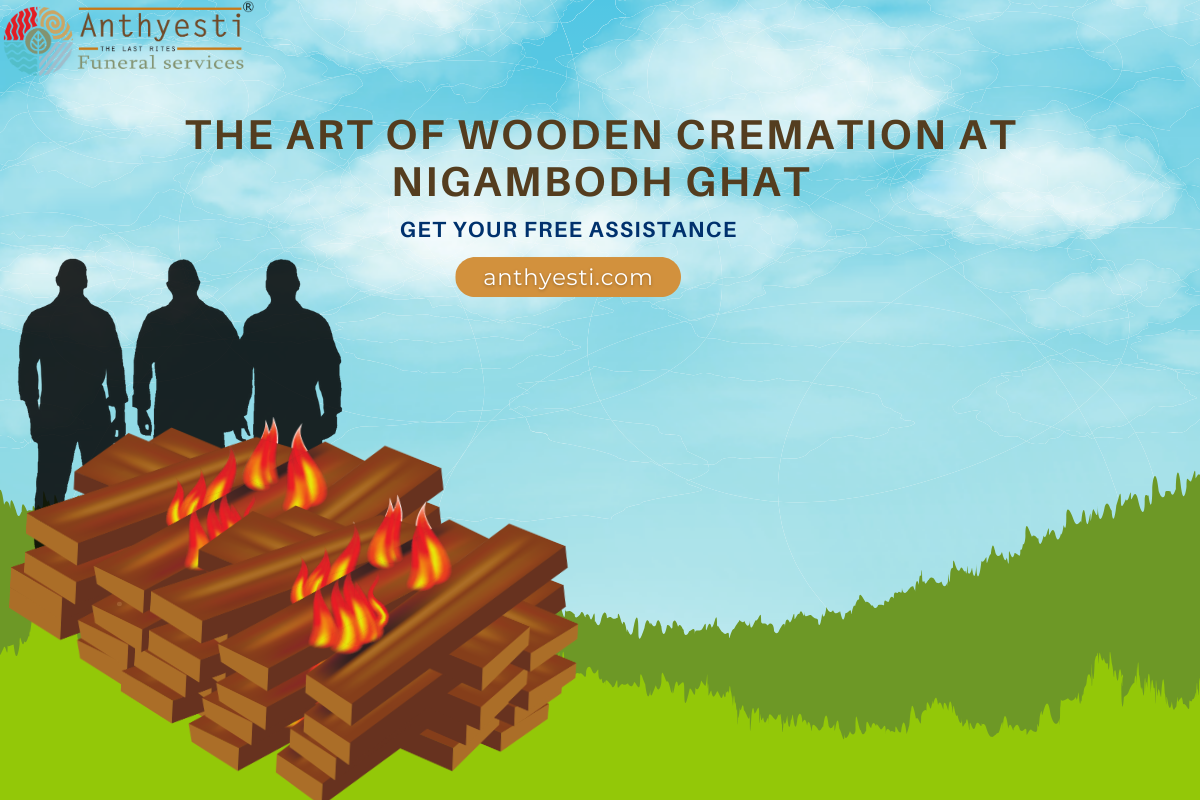Celebrating Delhi’s Legacy: The Art of Wooden Cremation at Nigambodh Ghat
Delhi, a city where the ancient meets the modern, is home to a site of immense cultural and spiritual importance: Nigambodh Ghat. Situated along the sacred Yamuna River, this cremation ground has served as a timeless sanctuary for performing Hindu funeral rites. Here, the tradition of wooden cremation continues to embody age-old customs and offers families a meaningful way to honor their loved ones.
Nigambodh Ghat: A Historical and Spiritual Landmark:
Nigambodh Ghat is one of the oldest cremation grounds in India, its origins deeply rooted in Hindu mythology. The name “Nigambodh” translates to “realization of Vedic knowledge,” derived from the belief that Lord Brahma regained his understanding of the Vedas at this site. Over centuries, this ghat has become a cornerstone of Hindu funeral traditions, offering a space for spiritual rites that mark the transition of the soul.
This site has witnessed farewells to many notable individuals and continues to be a preferred location for those seeking traditional Hindu cremation, reflecting the cultural depth and historical significance of the region.
The Tradition of Wooden Cremation:
Wooden cremation, a practice preserved at Nigambodh Ghat, is a deeply symbolic ritual that represents the Hindu belief in life, death, and rebirth. Despite modern advancements, this method remains significant for its spiritual, cultural, and environmental implications.
Why Wooden Cremation Holds Value
- Spiritual Relevance: In Hinduism, fire is sacred and symbolizes purification. Wooden cremation facilitates the release of the soul from its earthly body, guiding it to spiritual liberation.
- Eco-Spiritual Practices: Nigambodh Ghat promotes using untreated, eco-friendly wood, ensuring that ancient practices align with modern environmental concerns.
- Cultural Preservation: Wooden cremation keeps traditional Vedic rites alive, offering families a deeply fulfilling and culturally resonant way to say goodbye.
How Wooden Cremation Works
- Arranging the Pyre: The funeral pyre is built using wood to ensure proper and even combustion, symbolizing the soul’s release.
- Performing Rituals: Priests chant mantras and conduct rituals that invoke blessings for the deceased’s journey to the afterlife.
- Final Goodbyes: Family members place offerings and bid farewell as the body is committed to flames, marking the transition to the spiritual realm.
Modern Adaptations at Nigambodh Ghat:
While Nigambodh Ghat remains rooted in tradition, it has also evolved to meet contemporary needs. Upgraded facilities, including electric crematoriums, cater to families who prefer a faster and more environmentally friendly process. However, the wooden cremation area continues to preserve the sanctity and cultural richness of traditional Hindu funeral practices.
The sight of pyres burning by the Yamuna River not only represents an emotional farewell but also serves as a reminder of the impermanence of life, encouraging reflection and spiritual contemplation.
Anthyesti Funeral Services: Supporting Families at Nigambodh Ghat
Anthyesti Funeral Services understands the profound importance of ensuring a respectful and meaningful farewell for loved ones. Our comprehensive funeral arrangements at Nigambodh Ghat cater to those opting for traditional wooden cremation.
Our Services Include:
- Coordination with ghat authorities to streamline the cremation process.
- Provision of eco-friendly wood and essential materials for rituals.
- Assistance from experienced priests to perform Vedic rites.
- End-to-end logistical and emotional support for grieving families.
Our mission is to simplify the process during emotionally challenging times, enabling families to focus on paying their last respects.
Conclusion:
Nigambodh Ghat is more than a cremation site; it is a living testament to India’s cultural and spiritual heritage. The practice of wooden cremation not only honors the departed but also connects families to age-old traditions that emphasize the cyclical nature of life.
Anthyesti Funeral Services is committed to preserving these customs while providing compassionate and professional support. By facilitating traditional wooden cremation at Nigambodh Ghat, we help families bid farewell to their loved ones with dignity and respect.
For personalized assistance or inquiries, reach out to Anthyesti Funeral Services. Together, we can ensure that your loved one’s journey is both meaningful and serene.
FAQ’s:
1. What are the costs associated with wooden cremation at Nigambodh Ghat?
The cost ranges from ₹7,000 to ₹15,000, depending on the wood type and additional rituals performed.
2. Is wooden cremation environmentally sustainable?
Efforts at Nigambodh Ghat prioritize eco-friendly practices, using untreated wood and encouraging sustainable alternatives like tree-planting initiatives in memory of the deceased.
3. How long does the cremation process take?
The wooden cremation process typically takes 2-3 hours, depending on the size of the pyre and the rituals involved.
4. Can non-Hindus be cremated at Nigambodh Ghat?
While primarily serving the Hindu community, Nigambodh Ghat may accommodate non-Hindus who wish to follow Hindu cremation traditions, subject to prior approval from authorities.
5. Are electric cremation facilities available?
Yes, Nigambodh Ghat also provides electric cremation facilities, offering a quicker and more environmentally friendly alternative while maintaining ritualistic sanctity.
Call us at +91 87925 63332

